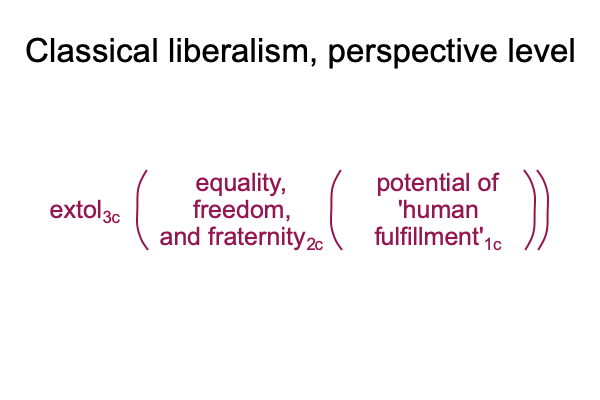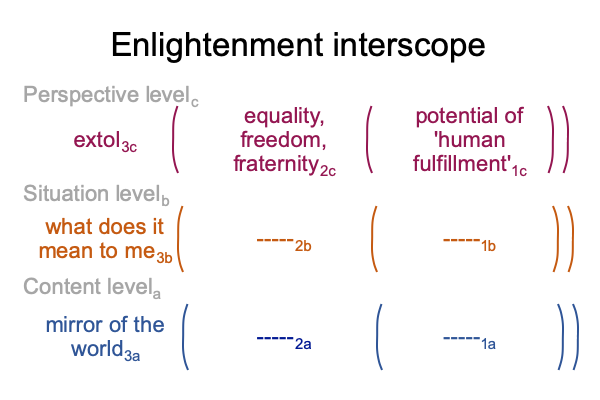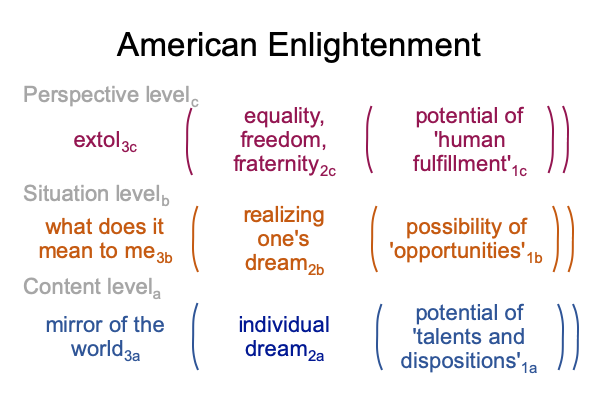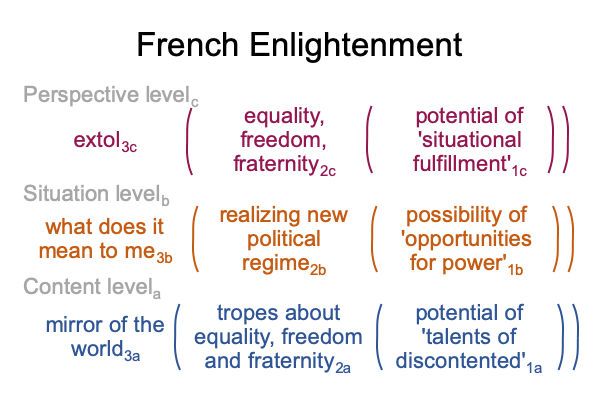0005 How should I define the righteousness of the classical liberal?
The classical liberal entertains a perspectivec that occludes the foundational world of Christianity. The classical liberal extols3c equality, freedom and fraternity2c. These2c are the means to human fulfillment1c.
The American Bill of Rights declares life, liberty and the pursuit of happiness. Equality is the right to life and justice. Freedom is the liberty to make one’s own choices. Fraternity involves private property. One must own the possessions that one shares with family, friends, teammates and other social circles. Otherwise, one usurps.
0006 The classic liberal perspective-level nested form looks like this.

0007 Surely, this perspectivec level does not contextualize marxist contenta and situationb levels.
Why?
Hazony speaks of two steps. In the first step, the Enlightenment covers up Christianity. In the second step, Marxism occludes the Enlightenment.
So, let me start at the first step.
Christian social virtues describe what God reveals about human sociality. Saint Paul discusses equality in his letters. Christ frees humans from the chains of original sin. The body of Christ, the Church, possesses an object that brings all into relation. Finally, all these actualities emerge from the potential that a human can attain eternal life with God, the ultimate fulfillment.
The Enlightenment makes these virtues immanent.
0008 What does this immanence entail?
How does the Enlightenment perspective play into situation and content levels?
0009 First, let me simply slide the normal contexts of the situationb and contenta levels of the marxist sensible construction underneath the Enlightenment perspectivec level. Here is the resulting three-level interscope, a relational structure discussed in A Primer on Sensible and Social Construction.

0010 Second, I fill in the blanks.
The content level actuality2a turns extols3c into a dream2a, an object associating with an individual’s future, choices and companions. The individual’s dream2a arises from talents and dispositions1a.
What possibility1b situates the individual’s dream2a?
Of course, there must be opportunity1b.
Then, with hard work and luck, one realizes2b that dream2a.
0011 This sounds so American. Here is the interscope.

0012 The French Enlightenment, on the other hand, rots as it ripens. Unlike eighteenth-century America, France is loaded with god-defying intellectuals, salon-attending little royals and cunning lawyers, who dream of running political affairs without the burden of king and church. They have talents and dispositions1a toward promoting organizational objectives2bbased on reason1b. Reason1b gives opportunity to righteousness1a. As such, their dreams2b,2a are tautological.
The Marxist frame, perceptively delineated by Hazony, develops in situ within French Enlightenment civilization. The sarcastic godless intellectuals, self-absorbed gossip-bearing little nobles and the reason-worshipping lawyers consider themselves to oppressed by the oppressors, king and church. King and church express a false consciousness. The system works for them, not everyone else, especially the discontented. Revolution will reconstitute society and the inherent ironies of the present regime will disappear.
0013 Here is a diagram.

